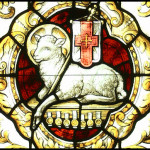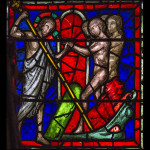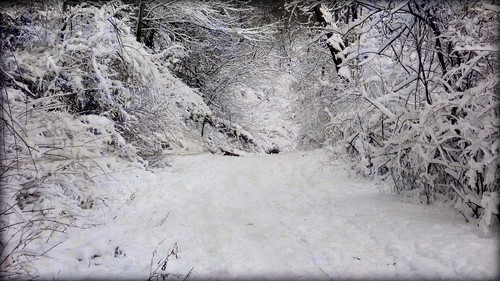We run our website the way we wished the whole internet worked: we provide high quality original content with no ads. We are funded solely by your direct support. Please consider supporting this project.
Did God Cause the Polar Vortex?
When is this polar vortex thing going to end? It’s March, and even in Minnesota we expect to see temperatures warmer than this. With all of the sleet and cold in the south, it seems like schools are closing more than they are open. While this is not a catastrophic event like a hurricane, tsunami, or earthquake, many still ask ask, “Why God?” Or, “God, when are you going to make this end.” And it’s not uncommon for some to say, “Well, the Good Lord knows what he is doing.”
This kind of talk reveals an underlying story that shapes how we commonly see God interacting with nature. It’s the story that God is orchestrating the weather, and one need not be a hard-core Calvinist to think this way. The following is an excerpt from Greg’s Satan and the Problem of Evil where he offers an alternative story about nature and natural evil, one that recognizes that “God is everywhere and at all times present in his creation maximizing good and minimizing evil. But to the extent that he has given creatures say-so, God has restricted the exercise of his own omnipotence” (213). As C. S. Lewis’s wrote in Mere Christianity, “Enemy-occupied territory—that is what the world is.” The following applies such a view to the realm of nature and natural evil.
_________________________________________
“In contrast to moral evil, ‘natural evil,’ says John Hick, ‘is the evil that originates independently of human actions: in disease bacilli, earthquakes, storms, droughts, tornadoes, etc.’ It is, in short, evil that lacks (or at least seems to lack) a moral agent behind it. It’s apparent cause lies within the ‘natural’ order of things” (243).
“Early Christian thinkers assumed that angels, like humans, were created free and given a sphere of influence and responsibility over creation and that, again like humans, angels could use this influence for good, as God intended, or for evil. … ‘Natural’ evil was explained as resulting from these spirits rebelling against God and thus abusing their authority over creation. Hence, for example, Origen argued that famines, scorching winds and pestilence were not ‘natural’ in God’s creation; they were rather the result of fallen angels bringing misery whenever and however they were able. …
“Reflecting the basic vision of the early church, Athenagoras [2nd century church father] concluded that everything in nature that obviously looks contrary to God’s character appears that way because it is contrary to God. It did not arise from the omni-benevolent hand of the Creator … but was due rather to the activity of this evil ‘ruling prince’ and the ‘demons his followers.’
“The view that evil spirits are largely responsible for ‘natural’ evil has been suggested throughout church history by many theologians. But due to the influence of Augustine’s blueprint model of divine providence, this insight was rarely considered the ultimate explanation of ‘natural’ evil, as it was before Augustine. The assumption was that everything Satan and demons do somehow fits into God’s meticulous plan for world history. Because of this, ‘natural’ evil has generally been regarded as a problem of understanding God’s providence, not an issue of spiritual warfare.
“Modern perspectives of ‘natural’ evil have drifted even further from the warfare perspective of Scripture and the postapostolic church. Under the influence of Enlightenment naturalism, rationalism, and biblical criticism, the very notion of evil spirits influencing the physical world became problematic. Physical laws became the ultimate explanation for anything in the physical world” (294-296).
Category: General
Tags: Natural Evil, Nature, Problem of Evil, Spiritual Warfare, Warfare Worldview
Related Reading

The (Spiritual) War on Terror
Jesus’ ministry was a ministry not of resignation but of revolt. He was about revolting against the cruel tyranny of a world ruler (Satan) that was oppressing God’s people. He was about seeking to give back to people, and to win back for his Father, what the enemy had stolen and destroyed. He was about…

Our Real Battle is NOT with ISIS or any Other “Enemy”
There’s an old African proverb that says, “When Elephants fight, the grass suffers.” It expresses the important truth that when agents who have a domain of authority go awry, everything under their authority suffers. The “principalities and the powers” were given tremendous authority over creation. In western Christian culture, these non-human agents are usually called…

Spiritual Warfare: What is it?
The Kingdom is “not of this world,” and neither is its warfare. Jews had always believed that God confronted spiritual opposition in carrying out his will on earth. In the Old Testament, these evil forces were usually depicted as cosmic monsters and hostile waters that threatened the earth. For a variety of reasons this belief…

The Warfare We Have Inherited
Image by Chris Sardegna Jesus’ miracles over nature, as well as his healings, exorcisms and especially his resurrection, were definite acts of war that accomplished and demonstrated his victory over Satan. These acts routed demonic forces and thereby established the kingdom of God in people’s lives and in nature. But their primary significance was eschatological. People…

God’s Kind of Holy War
This is part three of a series on Revelation. You can find part one here and part two here. While there will come a day when the sacrificial victory of the Lamb and of his people will be apparent to all (5:13; 15:4; 21: 23-4), only to those who embrace the perspective of the heavenly…

Thankful that God Outsmarted Satan
Concerning the cross, Paul wrote that God’s intent was “that through the church the wisdom of God in its rich variety might now be made known to the rulers and authorities in the heavenly places … in accordance with the eternal purpose that he has carried out in Christ Jesus our Lord” (Eph 3:10-11). One…

